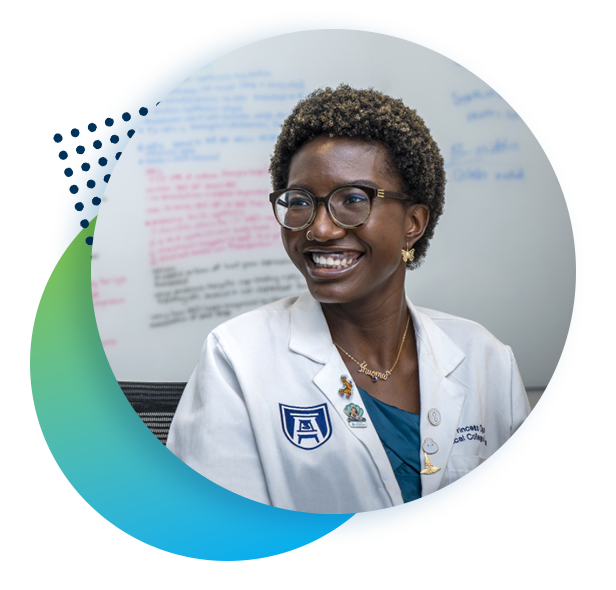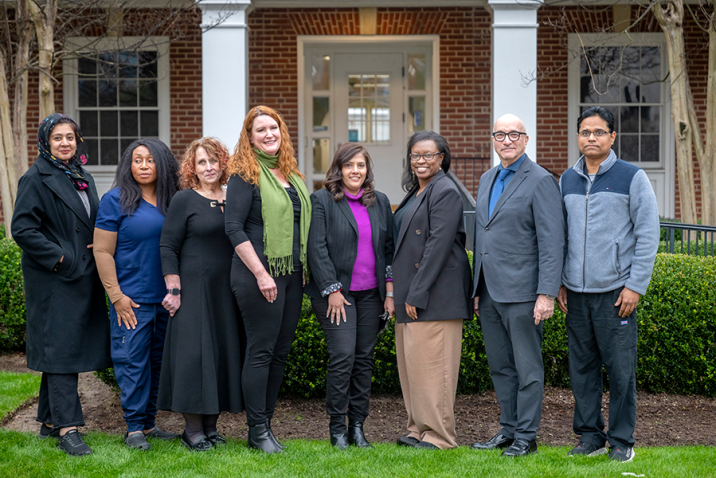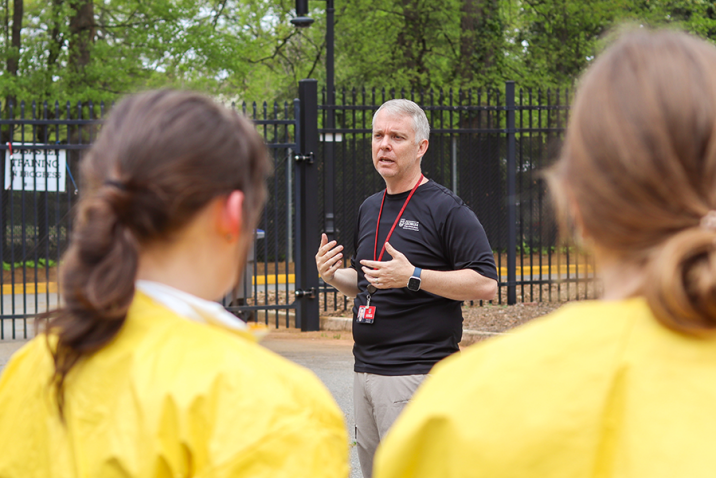Applied Health Sciences
A doctorate in Applied Health Sciences allows students to participate in an advanced research-focused program that examines various aspects of population health, emphasizing interdisciplinary approaches while preparing graduates for academic and non-academic careers.
The degree is designed for individuals seeking to deepen their understanding of public health and health services research (HSR) through advanced coursework, rigorous research, and the completion of a doctoral dissertation.
By choosing to earn your doctorate in Applied Health Sciences from Augusta University’s School of Public Health, you’ll be part of a program seeking to produce public health and healthcare researchers prepared to advance the discovery, dissemination, and application of new knowledge in public health and health sciences.
We have limited number of graduate research assistantships that are awarded on a competitive
basis.
Applied Health Sciences is for you if you consider yourself
Life-Changing
Life-Saving
Education
Want to learn more about the Applied Health Sciences program at Augusta University?
Request InfoApplied Health Sciences program
What You'll Study
Coursework
Students in Augusta University’s Doctor of Philosophy majoring in Applied Health Sciences
will complete 72 credit hours of coursework, including a dissertation.
The degree can be completed in three years but cannot take longer than seven years.
The average time to degree is approximately four to five years of full-time, year-round
study.
Curriculum | Admissions Criteria | Tuition and Fees | Application Deadlines



EXPLORE. EXCEL. EXPAND.
Graduate School Advantage
Augusta University's graduate programs are among the best in the nation – and the world – and our graduate students are our most valuable assets. To ensure that our students earn more than a degree, the Graduate School offers a range of opportunities so they can develop the leadership, communication and personal skills needed for a rewarding life and academic, research or professional career.
See what the Graduate School has to offer »
About the Graduate SchoolExperience-based Education
Outside the Classroom
Augusta University's Health Sciences and Summerville Campuses, serving as the epicenter
of the university's research endeavors, offer unparalleled opportunities for students
enrolled in the Applied Health Sciences PhD program. Here, students enjoy direct access
to a diverse array of seasoned and successful researchers, faculty, and cutting-edge
facilities.
Through courses instructed by doctoral faculty hailing from the School of Public Health
and across other Augusta University colleges, students benefit from a comprehensive
and multifaceted educational experience. This approach ensures a broad and nuanced
understanding spanning critical disciplines such as public health, epidemiology, health
policy, public and community health, and rigorous research methodologies in public
health, health services, and health outcomes, thereby preparing them for dynamic academic
and non-academic careers in the ever-evolving landscape of public health and healthcare.
Tailored Education
Flexible curriculum allows students to structure their coursework to achieve their educational objectives.
Collaborative Environment
The interdisciplinary nature of the degree provides advanced study and research training opportunities that enrich student understanding and advance discovery in public sciences.
Desirable Degree
Accreditation standards for academic programs in many fields are showing a preference for faculty with doctoral degrees.
Broad Possibilities
A doctorate in Applied Health Sciences is valued by many fields, including Public Health, Population Health, Health Services and Outcomines Research, and Health Policy.
Your Future
Career Options
A PhD in Applied Health Sciences offers promising job growth opportunities, particularly
in academic and non-academic careers in public health, health policy, health outcomes
research, health services research, population health, and more.
Graduates may work in domestic and international research centers, government agencies,
universities, and non-governmental organizations.
Profiles
Student Stories
One of the strengths of the program is the faculty. They are passionate about training students and always willing to go above and beyond. They take pride in making sure their students are excelling academically and are involved in impactful research projects.
Kendra Bufkin
As a clinician first and foremost, the program allows me to continue to think like one while I start transforming of becoming a scientist for which my research will support the advancement of my profession of physical therapy.
Lawrence Ramiscal
Admissions Criteria at a Glance
GPA: Overall GPA of at least 3.0 on a 4.0 scale on all previous college work. Applicants with an overall GPA of less than 3.0 can submit additional documents that include evidence of outstanding professional leadership, practice or scholarship for special consideration.
Degree Requirement: All potential applicants holding a master’s degree from an accredited college or university in areas related to public health (i.e. social/behavioral sciences, psychology, economics, health services research, epidemiology, management, policy, and health professions, etc.) are eligible to apply for admission. We also encourage students from a diverse field of training that are looking to advance their career in public health, health services research, and policy to apply to this program.
Applicants with undergraduate degrees in abovementioned or similar fields may apply to this program if they have strong demonstrated research or working experience in public health or related fields.
To be used to satisfy degree requirement, evaluation of foreign educational transcripts must show degree(s) earned that are the U.S. equivalency of degree(s) required by the program.
Transcripts: Official transcripts are required from all universities and colleges ever attended. Unofficial transcripts from US colleges and universities can be used in the admissions review process in lieu of official transcripts for this program.
Standardized Test Requirements: None are required for this program.
Letters of Recommendation: Recommendations from three individuals must be submitted through the application portal.
Resume: Applicants must submit a resume or curriculum vitae within the application portal.
Scientific Writing Skills: Writing is an essential component of the PhD program. If you have co-authored a peer-reviewed manuscript where you had a significant role, you may include with your application. Please note that prior publications are not a requirement for admission.
International Students: Please review the verification process for international transcripts and the English proficiency requirement.
Tuition & Fees Estimate
$4,801*
Estimated total
Full-time / In-State / Per Semester
$401
Tuition Per Hour
$675
Mandatory Fees
View Detailed Program Tuition
*Tuition & Fees listed here are for in-state students enrolling in the university for Fall 2024 semester.
Detailed Program Tuition InformationApplication Deadlines
Fall '26 International Application Deadline
- January 1, 2026
Fall '26 Application Deadline
- February 1, 2026 (extended to February 16, 2026)
Early submission of all application materials is strongly advised.
All required application materials and documents must be received in order for an application to be considered complete and before an admission decision can be made. The program will continue to accept supporting documentation up to four weeks after the application deadline.

Why Augusta?
The hands-on element of the program means you’re going to graduate with practical field experience and a network of colleagues and practitioners.
An established program with celebrated faculty means you’re prepared for the challenges of whatever work environment you choose.
As one of Georgia’s four research universities, Augusta University provides unparalleled access to groundbreaking researchers and the projects they’re involved with.

MCG’s Addiction Medicine Fellowship enters a new phase of growth
MCG’s Addiction Medicine Fellowship enters a new phase of growth
AU receives grants to help prevent overdoses throughout Augusta
AU receives grants to help prevent overdoses throughout Augusta

